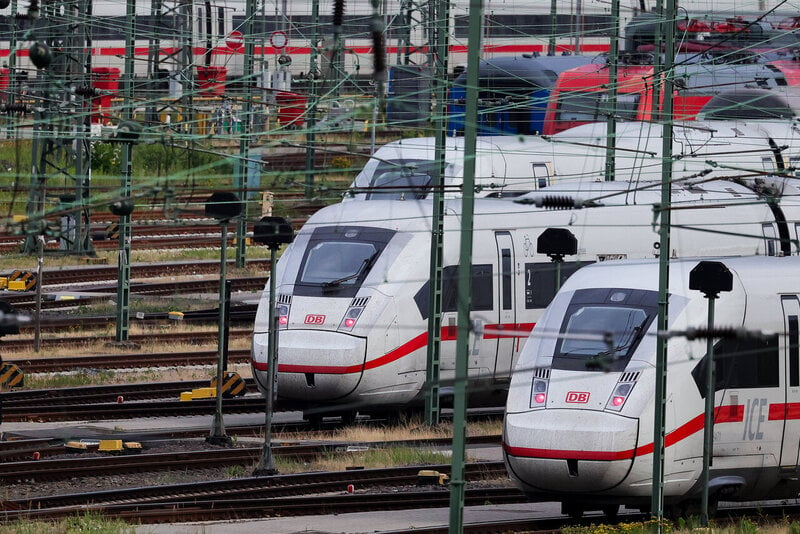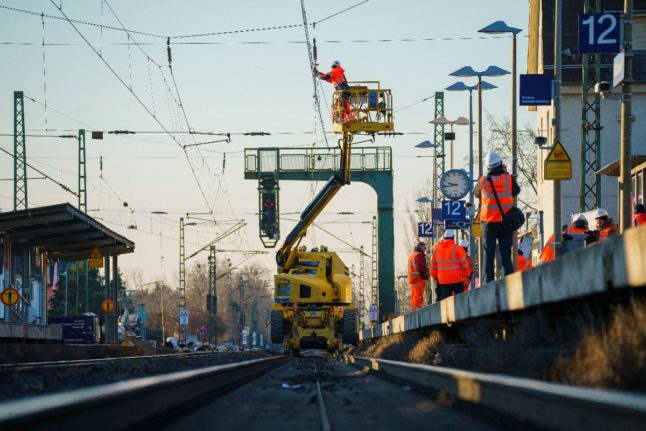Long-distance train travel in Germany has become hit by continuous delays in recent years – and one reason for that is the deteriorating rail infrastructure.
Deutsche Bahn has launched a massive overhaul to improve the network by 2030 – but it does mean that customers are seeing disruption get worse before it gets better.
The firm plans to invest €16.4 billion in a comprehensive infrastructure programme, with the aim of renewing about 2,000 kilometres of track, 2,000 points as well as upgrading several stations and bridges. Deutsche Bahn says it wants to make the existing infrastructure more efficient and robust while creating more capacity on the rail network.
READ ALSO: The shocking state of German trains exposes the myth about punctuality
Where is the focus of the work?
Modernisation and construction will be underway at around 1,000 stations and stops in 2024. This includes the main stations in Duisburg, Dresden, Hanover, Ulm and Munich.
Deutsche Bahn is also investing in lots of smaller and medium-sized stations, for instance to upgrade ‘barrier-free’ access for customers with mobility issues, weather protection and passenger information signs and screens.
“For the first time in many years, we will succeed in stopping the ageing of the railway infrastructure in 2024,” said Philipp Nagl, head of DB-InfraGO – the railway’s infrastructure company.
In day-to-day operations, passengers will see disruption on important routes. Construction sites have already led to major problems with punctuality.

READ ALSO: German government expects more punctual trains ‘by Christmas’
Where is major disruption expected?
On the way to improving punctuality and quality, passengers will have to deal with with diversions and longer journey times in many places – such as during the refurbishment of the Riedbahn between Frankfurt and Mannheim. Preparatory work is currently ongoing, while the renovation officially kicks off in July.
Its modernisation is the first of 40 so-called high-performance corridors to be tackled. As The Local has reported, the Frankfurt-Mannheim corridor is one of the busiest in Germany and its closure for works has a knock-on effect on the entire network by putting more passengers and trains on alternative routes – affecting the cross-country services that go through the area.
The line will is scheduled to reopen fully on December 14th 2024.
Other routes likely to be hit by disruption including diversions this year are:
- Kassel – Göttingen, due to completed by the end of May 2024
- Frankfurt am Main – Fulda, due to be completed by June 7th 2024
- Cologne – Frankfurt am Main, July 16th to August 16th 2024
- Erfurt – Eisenach, August 2nd to November 24th, 2024
- Hamburg – Schwerin, August 4th to November 22nd, 2024
- Karlsruhe – Freiburg, August 10th to 30th 2024
- Hamburg – Berlin, August 17th to December 14th 2024
- Hamm-Hagen, October 19th to December 14th, 2024
More work on the Hamburg-Berlin line is expected in 2025 as well as on the Emmerich-Oberhausen route. By 2030, the rail network is to be completely overhauled.
The routes are selected and prioritised in collaboration with the federal government as well as local transport authorities and associations.
At the moment, just 64 percent of German trains run on time, meaning they arrive at their destination within six minutes of the scheduled arrival time. The government wants to hike that up to 70 percent in the short-term, with the goal of increasing that to 80 percent by 2030.
READ ALSO: More staff, longer transfer times: How rail travel in Germany is being improved



 Please whitelist us to continue reading.
Please whitelist us to continue reading.
Member comments